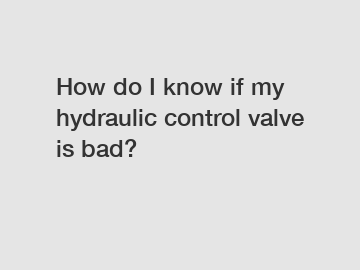How do I know if my hydraulic control valve is bad?
How do I know if my hydraulic control valve is bad?
Hydraulic control valves play a crucial role in the proper functioning of hydraulic systems. These valves regulate the flow and direction of hydraulic fluid, allowing the system to perform various functions. However, like any other mechanical component, hydraulic control valves can wear out or develop faults over time. Identifying if your hydraulic control valve is bad is essential to ensure the smooth operation of your hydraulic system and prevent any potential damage. In this article, we will discuss some common signs that indicate a faulty hydraulic control valve.
1. A sudden loss of pressure.

One of the primary indicators of a bad hydraulic control valve is a sudden loss of pressure in the system. If you notice a significant drop in the pressure of the hydraulic fluid, it could mean that the valve is not functioning properly. This can affect the performance of your hydraulic equipment, leading to decreased efficiency and potential failure.
2. Erratic or jerky movements.
When a hydraulic control valve is faulty, you may observe erratic or jerky movements in the hydraulic system. The valve's role is to regulate the flow of fluid, allowing for smooth and controlled movements. If the valve is not functioning correctly, it can cause the fluid flow to become disrupted, resulting in uneven or unpredictable movements in the hydraulic system.
3. Fluid leaks.
Another common sign of a bad hydraulic control valve is the presence of fluid leaks. If you notice fluid leaking around the valve or any other part of the hydraulic system, it is a clear indication of a malfunctioning valve. Fluid leaks can lead to a decrease in hydraulic fluid level, compromising the overall performance of the system and potentially causing damage to other components.
4. Unresponsive controls.
If your hydraulic control valves are in good working condition, you can expect the controls to be responsive and accurate. However, a faulty valve may result in unresponsive controls, making it difficult to operate the hydraulic system effectively. This can be a safety concern as it may reduce your ability to control and maneuver hydraulic equipment efficiently.
5. Strange noises.
Unusual noises, such as grinding, whining, or clunking sounds, can also indicate a problem with your hydraulic control valve. These noises can occur when the valve is damaged or has excessive wear. It is important not to ignore these sounds as they can be an early warning sign of a potential valve failure or a larger issue within the hydraulic system.
It is crucial to address any issues with your hydraulic control valves promptly. Ignoring or neglecting the signs of a bad valve can lead to more severe damage to your hydraulic system, resulting in costly repairs or even complete system failure.
If you notice any of the aforementioned signs indicating a faulty hydraulic control valve, it is advisable to consult a professional hydraulic service provider. They have the expertise and diagnostic tools required to accurately assess the condition of the valve and recommend the appropriate course of action. Regular maintenance and inspections are also recommended to prevent potential problems and ensure the longevity of your hydraulic system.
In conclusion, being aware of the signs that indicate a bad hydraulic control valve can help you identify and address issues promptly. Remember, timely maintenance and repairs are key to preventing further damage and maximizing the performance of your hydraulic system. If you require assistance or have any queries regarding your hydraulic control valve, do not hesitate to contact us. Our experienced team is ready to provide the necessary support and expertise to keep your hydraulic system running smoothly.
Want more information on electro hydraulic proportional valves, Three Way Proportional Reducing Valve, Rotary Directional Valve? Feel free to contact us.
187
0
0

Comments
All Comments (0)